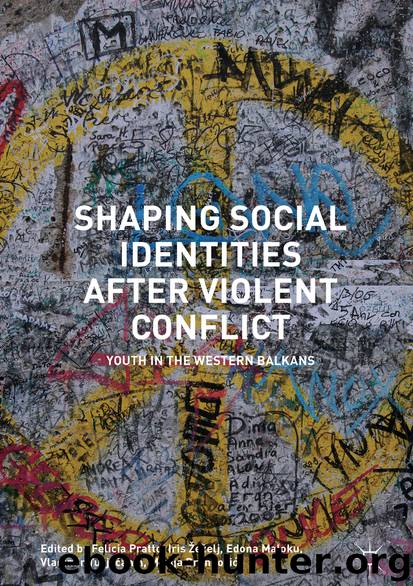Shaping Social Identities After Violent Conflict by Felicia Pratto Iris Žeželj Edona Maloku Vladimir Turjačanin & Marija Branković

Author:Felicia Pratto, Iris Žeželj, Edona Maloku, Vladimir Turjačanin & Marija Branković
Language: eng
Format: epub
Publisher: Springer International Publishing, Cham
In alignment with empirical findings (e.g., Blake, Pierce, Gibson, Reysen, & Katzarska-Miller, 2015; Reysen & Katzarska-Miller, 2013), viewing oneself as a global citizen (or citizen of the world) seemed to be associated with an interrelated set of prosocial values (e.g., valuing diversity, intergroup empathy).
None of the participants spontaneously mentioned national, ethnic, or religious groups as important for describing him/herself, which could be due to the distinctiveness postulate . The distinctiveness postulate implies that what is salient in a person’s spontaneous self-concept is the person’s peculiarities, the ways in which one differs from other people in one’s customary social environment (McGuire, McGuire, Child, & Fujioka, 1978). Since the focus group participants were homogeneous in terms of national, ethnic, and religious affiliation, we could say that in this milieu, participants were less aware of their nationality, ethnicity, and religiosity, and therefore their identifications with these groups were less salient. At the same time, in the context of group similarity, personal beliefs, traits, and attributes took primacy in describing one’s self, as a way to satisfy the need for distinctiveness.
However, during the focus group discussions and case study interviews, it was noted that ethnic, religious, and national identities easily become salient and that there is a dense network of identity markers in the wider social surroundings that aim to trigger these identities. For example, in the focus groups, following a discussion on who are the Us and the Them, participants were asked to complete a sentence expressing their immediate, uncensored associations. The participants’ associations were mainly related to national, ethnic, or religious groups, suggesting that by altering the frame of reference so that different characteristics become distinctive, the participants’ self-concept alters in predictable ways. For example: “We are… Serbs; They are… Ustashe;1 They see us as… Chetniks. 2 After the discussion, ‘Serb’ becomes my first association to myself.” (Serb, female, Belgrade). These identity markers are usually tailored to the dominant ethnic majority and not inclusive of the minorities: for example, the national flag, which bears Serbian symbols, and the anthem with the chorus “God save the Serbian land and Serbian people.” However, they trigger both the dominant and the minority ethnic identity at the same time, consequently making the borders between the groups more visible and stricter.
Although participants mentioned different social groups while describing their identities, they recognized that not all groups are equally important. Family and friends were mentioned as the most important ones. This is also supported with the results that we obtained through analyzing quantitative data. Quantitative data indicate that young people from Serbia generally demonstrate moderate levels of identification with different social categories such as ethnicity, religion, country, region, and so on (see Fig. 5.2). The family group and the group of friends, with which Serbian youth identifies more strongly than with other social groups, stand out from this pattern. Such a trend is not surprising, as other studies from this region also report that family identity typically prevails over other social identities (e.g., Kalaba, 2013; Milošević-Đorđević, 2007; Stjepanović Zaharijevski, 2008).
Download
This site does not store any files on its server. We only index and link to content provided by other sites. Please contact the content providers to delete copyright contents if any and email us, we'll remove relevant links or contents immediately.
Rewire Your Anxious Brain by Catherine M. Pittman(18640)
Talking to Strangers by Malcolm Gladwell(13344)
The Art of Thinking Clearly by Rolf Dobelli(10446)
Mindhunter: Inside the FBI's Elite Serial Crime Unit by John E. Douglas & Mark Olshaker(9315)
Becoming Supernatural by Dr. Joe Dispenza(8198)
Change Your Questions, Change Your Life by Marilee Adams(7756)
Nudge - Improving Decisions about Health, Wealth, and Happiness by Thaler Sunstein(7689)
The Road Less Traveled by M. Scott Peck(7592)
The Lost Art of Listening by Michael P. Nichols(7487)
Mastermind: How to Think Like Sherlock Holmes by Maria Konnikova(7316)
Enlightenment Now: The Case for Reason, Science, Humanism, and Progress by Steven Pinker(7305)
Win Bigly by Scott Adams(7183)
The Way of Zen by Alan W. Watts(6596)
Daring Greatly by Brene Brown(6501)
Big Magic: Creative Living Beyond Fear by Elizabeth Gilbert(5753)
Grit by Angela Duckworth(5601)
Ego Is the Enemy by Ryan Holiday(5412)
Men In Love by Nancy Friday(5232)
The Laws of Human Nature by Robert Greene(5170)
